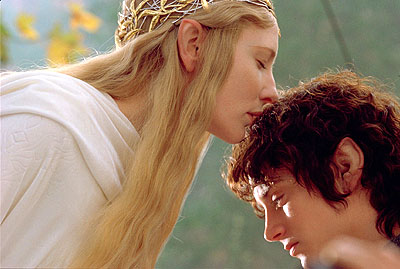Into the Void (5)
By:
July 25, 2010

We’ve been shocked to see so many io9 readers defending Joseph Campbell in the comments on our hero’s journey post. Hey, we got stoned and read The Hero With A Thousand Faces in college, just like everybody else, and we thought it was super deep. All those primal archetypes and spiritual patterns were totally hardwired into the joint checking account of our collective unconscious. But that didn’t mean we wanted to watch a thousand movies and read ten thousand books based on Campbell’s dime-store anthropology.
Here are some reasons why Campbell should go back on the shelf.

- It’s a formula. Any storytelling formula is going to be lame. Of course, Campbell didn’t think he was prescribing a formula. He thought he was describing the pattern that’s inherent in all the great stories. But over time, lazy writers like George Lucas have used it as a checklist. It’s just as boring as the video game where you have the level bosses and then you have the big boss at the end. Except in the “Journey,” it’s the guardians of adventure, followed by the “dragon,” followed by the final battle.
- It discourages originality. By the same token, if you claim that every great story is really just the same great story with surface changes, you’re encouraging people to plagiarize the hell out of old stories. Instead of championing stories that are different, like say, Firefly/Serenity or James Robinson’s Starman, you’re tempted to call a schlock-fest like the original Star Wars “mythic” because it’s about a hero who’s singled out.
- Why is one hero so special anyway? The hero doesn’t just get the “call to adventure” because everyone’s getting it. He gets it because he’s the most important person alive, with the most special skillz or the biggest brain. Everybody who’s not him sucks and should go away. It plays into people’s fantasies that they’re secretly amazing, without having to work for it. But for those of us who aren’t Ender Wiggin or Luke Skywalker, it’s just pointless. What about a hero who’s the greatest because she decides not to put up with the shit that everybody else is putting up with? What about a group of people who decide to work together to change the crappy status quo?
- The “hero” is always a d00d. Why does the hero encounter the goddess halfway through? Because she’s hawt and he’s a guy. If the hero was a chick, would the goddess be a dude? Somehow we doubt it.
- It’s cheesy as hell. Here are some choice New Age-y quotes from Campbell. Sample quote: “Your sacred space is where you can find yourself again and again.” Woah, dude. I just felt my crystals vibrate a little. Campbell also appears to be the inventor of the phrase “follow your bliss.”
- He shoehorned a lot of myths into his theory. Campbell himself writes, in Thousand Faces, that he’s not interested in exploring the differences between myths, just the similarities. In other words, he looked for whatever similarities he could find and overlooked any differences as “variations” in his monomyth. He also ignored countries outside the Indo-European tradition, like East Asia and Africa.
- It confuses personal growth with solving problems. Sometimes in order to defeat a great evil, you have to learn an important personal lesson and grow as a person. But often, you don’t. Oftentimes, defeating a great evil just requires fighting like hell and doing what has to be done, and there’s no time to meet the goddess or touch your magic wand or any of that stuff. Campbell’s monomyth is unrealistic and spreads the idea that war is therapy.


Bottom line: Riding on the track Campbell laid down will get you a cheesy story about the most specialest guy in the universe, who saves everybody with a little help from his companions and who gains a wonderful spiritual “boon” that enriches everybody along the way. Save it for high fantasy. We’d rather have a variety of messy stories in our science fiction.
Because we dig the sci-fi blog io9, HILOBROW’s editors have curated a collection of critiques by one of our favorite io9ers: Charlie Jane Anders. This is the fifth in a series of ten. This post was first published on January 17, 2008.
